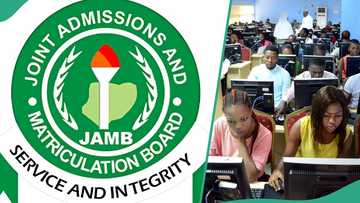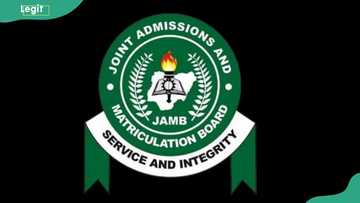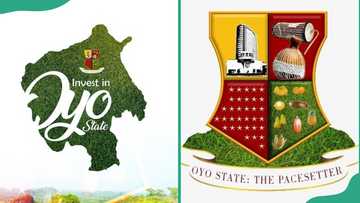SCUML registration: how to register and get your certificate
SCUML registration is a legal requirement for businesses classified as Designated Non-Financial Businesses and Professions (DNFBPs) in Nigeria. It helps prevent money laundering and protects businesses from financial crimes. To register, you must submit your company documents through the SCUML website.
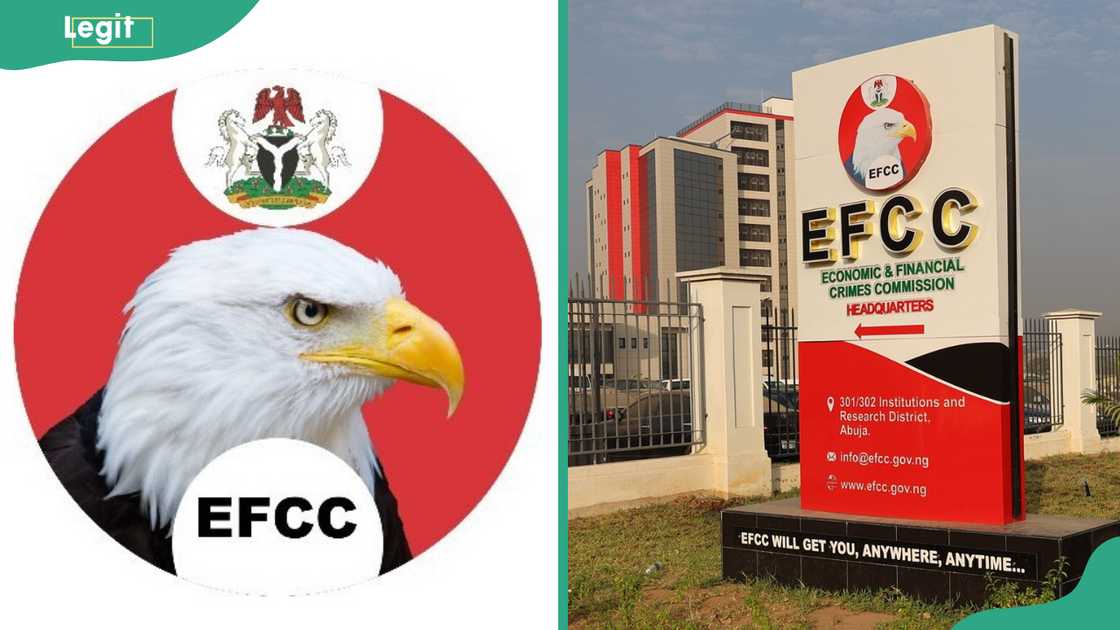
Source: UGC
TABLE OF CONTENTS
- Key takeaways
- SCUML registration process
- How to check SCUML registration status
- Why is SCUML registration necessary?
- Who needs SCUML?
- What documents are required for SCUML?
- SCUML certificate sample
- How much does it cost to get a SCUML certificate in Nigeria?
- How long does it take to get SCUML?
- What is the SCUML registration deadline?
- SCUML contacts
Key takeaways
- SCUML monitors and prevents money laundering in Nigerian DNFBPs.
- Failure to register can result in fines, bank account restrictions and loss of credibility.
- Registration is free and takes up to 7 working days after submission.
- Businesses must register within 3 months of starting operations.
- You can track your SCUML application status online using your CAC number or company name.
SCUML registration process
Follow the steps below to learn how to obtain a SCUML certificate online.
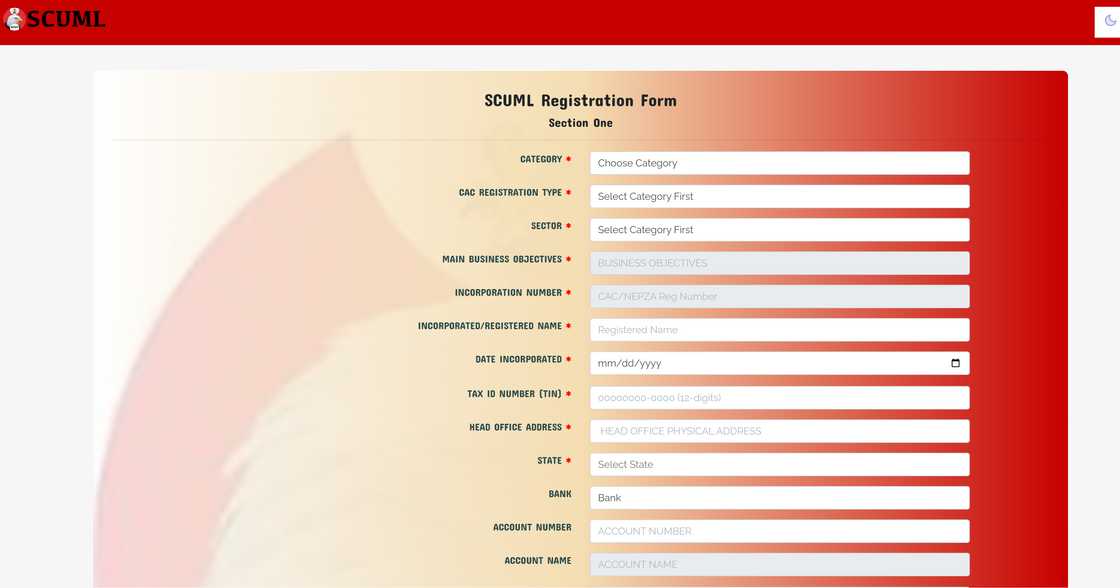
Source: UGC
- Visit the SCUML website and click on the “DNFBPs Online Registration” tab.
- Scroll down and click the "Proceed with Online Registration" button.
- Fill in the SCUML registration form by providing accurate business details, including the company’s name, registration number, and beneficial owners.
- Upload scanned copies of all necessary documents, such as CAC registration, tax clearance, and tax identification certificates.
- SCUML will review the application and verify all submitted information. Once approved, you will get your certificate of registration.
Once the application is approved, DNFIs must undergo a sensitisation session. The original CAC certificate must be presented before collecting the SCUML certificate.
How to check SCUML registration status
To track your SCUML application status, follow these steps:

Source: UGC
- Visit the SCUML website.
- Click the “SCUML Application Status” tab.
- Enter your CAC Registration Number (without space) or your Company name, then click “Search”.
- Your application status will display on the screen, showing if it is under review, approved, or pending further documentation.
Why is SCUML registration necessary?
SCUML registration is crucial for several reasons highlighted below:
- Registration helps protect businesses from money laundering and other financial crimes.
- It enforces internal controls and promotes the reporting of suspicious activities.
- Compliance enhances business credibility and builds trust with customers, partners, and stakeholders.
- A registered business may access more opportunities through improved reputation and compliance.
Who needs SCUML?
The Designated Non-Financial Institutions (DNFBPs), as defined under section 30 of the Money Laundering Prevention and Prohibition Act, 2011, include:
- Dealers in Jewellery
- Car dealers
- Casinos, pool betting, and lottery businesses
- Law firms, notaries, and independent legal practitioners
- Accountants and accounting firms
- Estate surveyors and valuers
- Dealers in precious stones and metals
- Trust and company service providers
- Dealers in luxury goods
- Audit firms
- Tax consultants
- Construction companies
- Mortgage brokers
- Dealers in mechanised farming equipment and machinery
- Practitioners of mechanised farming
- Consultants and consulting companies
- Hospitality industry
- Clearing and settlement companies
- Supermarkets
- Importers and dealers in motor cars.
- Real estate agents, estate developers, estate agents, and brokers
What documents are required for SCUML?
To complete the SCUML registration process, various documents must be submitted depending on the type of Designated Non-Financial Institution (DNFI). Below is a breakdown of the specific requirements for each category.
Limited liability companies
For limited liability companies, several legal and tax documents must be submitted. These are essential for confirming the company’s legal status and tax compliance.
- Certificate of incorporation
- Memorandum and Articles of Association (MEMART)
- Form CAC2 and CAC7
- Evidence of tax registration
Business names
If registering as a business name, the following documentation must be presented to demonstrate the business’s legal formation and tax standing:
- Certificate of incorporation
- Form BN-01 (Proprietor’s Particulars)
- Evidence of tax registration
Note: Professional companies must provide professional certificates, such as those for law firms, accounting firms, and audit firms.
Non-governmental organisations (NGOs)/non-profit organisations (NPOs)

Source: Facebook
NPOs and Non-profit Organisations require proof of their legal registration and governing documents. These documents help confirm the organisation’s legitimacy and operational framework:
- Certificate of incorporation/registration
- Incorporation of trustees or CAC7
- Constitution or Memorandum & Articles of Association
State registrations
State-based organisations must provide registration proof from relevant authorities. This includes legal and identification documents for the key members:
- Certificate of registration from the state
- Constitution
- Copies of valid identification for at least three executive members
International NGOs/NPOs
For international organisations, the required documents confirm their registration with Nigerian authorities and their operational guidelines:
- Evidence of registration with the National Planning Commission (NPC)
- Constitution
- Organisational profile
SCUML certificate sample
After completing your application, you will receive a SCUML certificate. Below is a sample SCUML certificate.
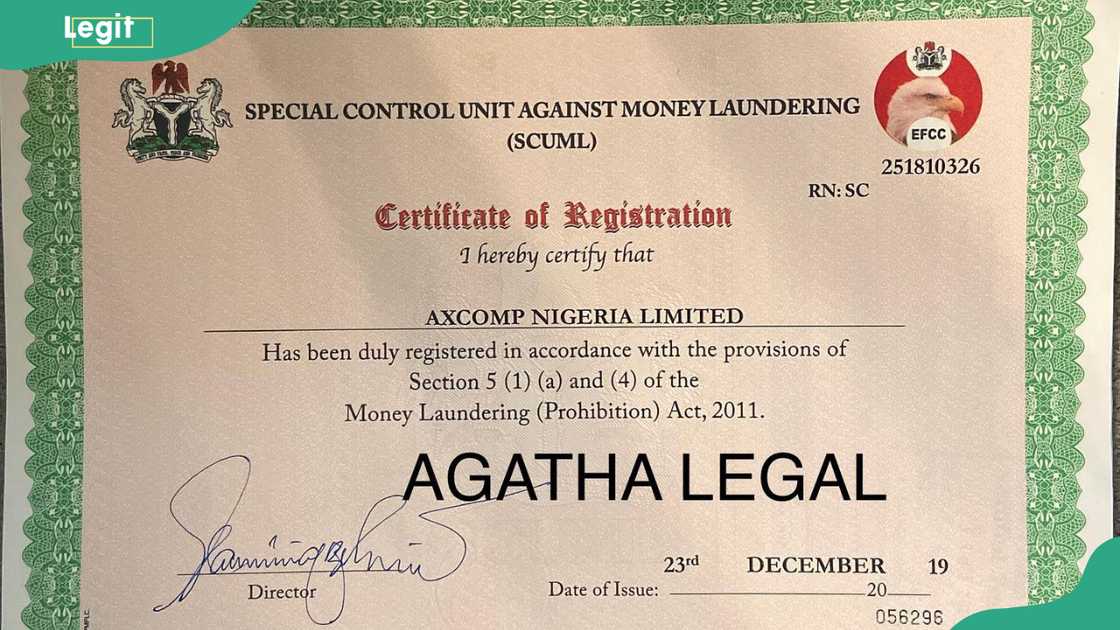
Source: UGC
How much does it cost to get a SCUML certificate in Nigeria?
The SCUML registration process is free. Applications are submitted online via the SCUML website without any fees.
How long does it take to get SCUML?
Processing a SCUML application takes around seven working days from the date the application is received, provided all documents are complete.
What is the SCUML registration deadline?
A DNFI must complete SCUML registration no later than three months after the commencement of business activities.
SCUML contacts
In case you have any queries during your registration process, you can contact SCUML offices or reach them by phone or email at the following locations:
Abuja
- Physical address: No 5 Fomella Street, Off Ademola Adetokunbo Crescent, Wuse II, Abuja, FCT.
- Email: infoscuml@efcc.gov.ng
- Tel: 09159090952 | 08186886219 | 08183754112
- WhatsApp: 09159090953
Lagos
- Physical address: 15, Awolowo Road, Ikoyi, Lagos, Lagos State.
- Email: lagosscuml@efcc.gov.ng
- Tel: 08098044926
Kano
- Physical address: GP 360 Bida Road, Civic Center, Kano.
- Email: kanoscuml@efcc.gov.ng
- Tel: 08109185147
Enugu
- Physical address: Plot 106 Federal Government College Road, Independent Layout, Enugu State.
- Email: enuguscuml@efcc.gov.ng
- Tel: 07054099561
Maiduguri
- Physical address: Plot 80 Baba Shehu Lamin Street, Opposite Elkanemi College, Tudun Wada Layout, Maiduguri, Borno State, Nigeria.
- Email: maiduguriscuml@efcc.gov.ng
- Tel: 08096495000
Ibadan
- Physical address: 16, Rev Oyebode Crescent, Iyaganku, G.R.A, Ibadan, Nigeria.
- Email: ibadanscuml@efcc.gov.ng
- Tel: 08096492000
Edo
- Physical address: No. 2 Court Road, By Reservations Road, GRA, Oka, Benin City, Edo State, Nigeria.
- Email: edoscuml@efcc.gov.ng
Gombe
- Physical address: No 4 EFCC Street, New G.R.A, Gombe State.
- Email: gombescuml@efcc.gov.ng
- Tel: 08152966019
Port Harcourt
- Physical address: No 8 Bank Road, Off Moscow Road, Port Harcourt, Rivers State.
- Email: phscuml@efcc.gov.ng
- Tel: 08167599894
Kaduna
- Physical address: No. 4 Wurno Road, Badarawa, Kaduna, Kaduna State, Nigeria.
- Email: kadunascuml@efcc.gov.ng
- Tel: 08096493000
SCUML registration is an important step for businesses classified as DNFIs in Nigeria. It ensures legal compliance and protects businesses from being involved in financial crimes. By completing SCUML registration, your business strengthens its credibility and opens doors to more partnerships and opportunities.
DISCLAIMER: This article is not sponsored by any third party. It is intended for general informational purposes only and does not address individual circumstances. It is not a substitute for professional advice or help and should not be relied on to make decisions of any kind. Any action you take upon the information presented in this article is strictly at your own risk and responsibility!
Legit.ng recently published an informative post on how to calculate Moniepoint charges. Understanding Moniepoint transaction charges helps you know your daily POS profit. Each transaction type—withdrawal, transfer, or deposit—has its specific charge rate.
Moniepoint charges vary based on the transaction type and amount. Charges may be fixed or percentage-based. Transfers and deposits also follow different charge structures. Read on to learn how to calculate Moniepoint charges to track your earnings accurately.
Source: Legit.ng

